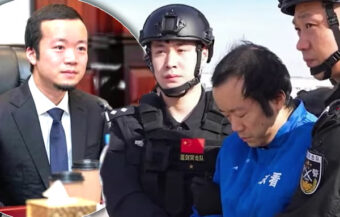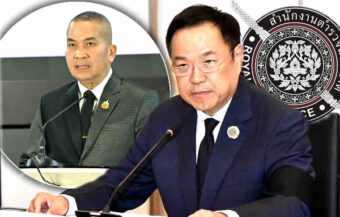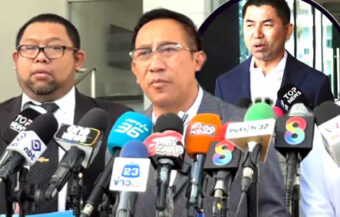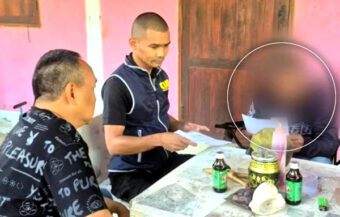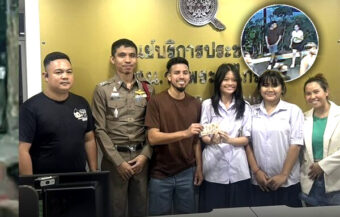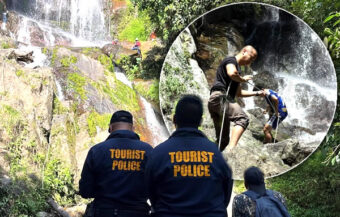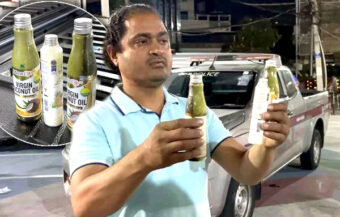Thai bus driver arrested for stealing ฿280,000 from Romanian tourist’s credit card, highlighting rising fraud in Bangkok and Phuket. With scams surging amid economic strain, authorities warn tourists to stay vigilant as tourism recovery faces new threats.
Thai police in Surat Thani on Wednesday announced the arrest of a bus driver who stole ฿280,000 from the bank account of a Romanian tourist holidaying in Thailand. Authorities assured the victim that her money would be returned following the prosecution of the suspect, 34-year-old Channarong Boonjui. The case emerged on the same day Mastercard issued a warning about a rise in travel-related scams affecting foreign tourists in Bangkok and Phuket. This is the last thing officials want to hear, as the country struggles to meet its foreign tourism targets for the year. However, the case underscores a deeper problem Thailand is facing. With money in tight supply and household debt at record levels, many ordinary people are being tempted to turn to crime. In turn, this is hurting the critical tourism sector, fuelling a vicious cycle that threatens to undermine economic recovery.
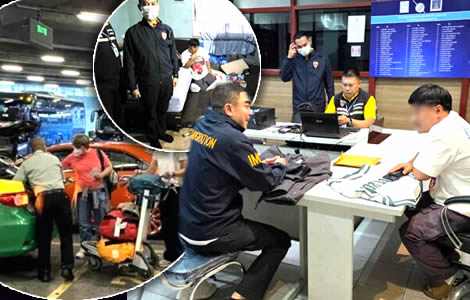
A Thai bus driver has been arrested for stealing a tourist’s credit card and draining it of ฿280,000. The case, involving a Romanian tourist, has deepened concerns over Thailand’s growing reputation as a global scam hotspot—especially in Bangkok and Phuket.
Police arrested 34-year-old Channarong Boonjui at his home in Talad subdistrict, Muang district, Surat Thani. He had allegedly used a stolen credit card belonging to Cristina Banaga, a Romanian national, to make 14 separate ATM withdrawals across the province.
Authorities recovered the full amount in cash, along with clothing seen in CCTV footage.
Coach driver confesses to stealing PIN-tagged card and draining funds after Koh Phangan to Phuket journey
Boonjui, a long-haul coach driver, confessed to taking the card from his tour bus. According to his statement, he found it after transporting tourists from Koh Phangan to Phuket. The card had a paper slip attached showing the PIN code. Tempted, he tried it at an ATM. When it worked, he kept going back. Soon, he had withdrawn all the funds—฿280,000 in total.
The victim, Ms Banaga, had boarded the bus to Phuket unaware her credit card had slipped from her bag. She only realised it was missing after checking her bank account. Shocked by a series of large cash withdrawals, she rushed to Saku Police Station to file a complaint.
Police moved fast. They tracked the withdrawals to ATMs around Surat Thani city. Surveillance footage showed a man using the card while driving a white car. That car was later linked to Boonjui. Investigators obtained a warrant from the Surat Thani Provincial Court and raided his house on Talad Mai Road.
Inside, officers found the stolen cash neatly stacked in envelopes. They also found the same outfit the suspect wore in the ATM footage. Immigration Police said the evidence left no doubt.
Mastercard flags Bangkok and Phuket for rising scam risks as tourism fraud incidents multiply
Boonjui now faces three criminal charges: theft, unlawful possession of an electronic card, and fraudulent financial use. He was transferred to Phuket, where the initial complaint was filed, for prosecution.
This brazen case has made headlines—but it’s far from isolated. A recent Mastercard report listed Bangkok and Phuket among the worst global hotspots for tourist scams. It warned that scam rates in Thailand had surged 28% during peak travel seasons.
According to Mastercard’s “Protecting Travel in a Digital Age” report, Bangkok ranked second worst globally for travel-related fraud. Phuket came third. Both cities are now red-flagged for financial fraud and deceptive tourist services.
David Mann, Mastercard’s Chief Economist for Asia Pacific, said scam types differ by location. “In Bangkok, scams often involve transport—taxis, buses, and dodgy tours,” he said. “Phuket, on the other hand, sees more fraud in hotel bookings and payment systems.”
The Boonjui case is a classic example. A legitimate service provider used his access to a traveller’s belongings to commit a financial crime. While the PIN code was carelessly left attached, authorities say that doesn’t excuse theft.
Thai police and tourism leaders warn of deepening economic impact as scams threaten fragile recovery
“This case hurts Thailand’s image,” said Police Lieutenant General Panumat Boonyalak. “We must respond quickly and rebuild confidence among tourists.”
Tourism accounts for around 12% of Thailand’s GDP. Indeed, it accounts for 20% of employment and the country’s grassroots money in circulation. Therefore, incidents like this have wide-reaching economic impacts. After COVID-19, Thailand has worked hard to recover foreign arrivals. A spate of scams could jeopardise that recovery.
Significantly, this is occurring amid record levels of household debt in Thailand and declining disposable income for ordinary people. This has seen a tightening this year in domestic spending. Of course, as this case illustrates, it is also tempting some people to commit criminal acts.
Authorities have promised swift legal action. However, critics argue that prevention—not just prosecution—is urgently needed. Many are calling for tighter screening of drivers, more baggage oversight, and digital fraud detection tools.
Meanwhile, Mastercard warned that fraud is no longer limited to the ground. Increasingly, it happens before tourists even board a flight. Fake booking sites, cloned payment portals and phoney travel deals are now widespread.
Growing tourist complaints detail scams from Koh Samui to Phuket, Bangkok taxis to fake villa listings
Thailand’s tourism watchdogs are concerned. “We’ve seen rising reports of travellers being scammed before arriving,” said a Tourism Authority official, speaking in background. “But when theft happens during a trip—by someone meant to help—it’s much worse.”
Mr Channarong’s arrest follows a pattern of transport-linked scams. Long-haul bus routes from Koh Samui, Krabi, and Surat Thani to Phuket are frequently mentioned in scam forums. Travellers report stolen luggage, overcharges, and fake breakdowns used to demand extra cash.
Bangkok has also seen high-profile cases involving “ghost taxis” and tour operators offering fake excursions. In some cases, tourists were led to bogus gem shops or overpriced restaurants with staff receiving kickbacks.
Phuket, for its part, struggles with rental scams and hotel fraud. Dozens of travellers have reported paying deposits for villas that don’t exist. Others have booked rooms online only to arrive and find nothing available.
The Mastercard report noted that taxi and transport scams made up 46% of tourist complaints in Bangkok. In Phuket, 39% involved financial fraud, including payment skimming, ATM tampering, and digital card cloning.
Fraud, Digital Crime, and failing oversight blamed as police say Boonjui case could lead to more arrests
That’s why Channarong Boonjui’s case is so symbolic—it connects all three: transport, financial fraud, and betrayal of trust.
Police say Ms. Banaga’s quick reaction helped them act fast. She contacted her bank, froze her card, and gave precise details to local officers. That allowed investigators to narrow the timeframe and identify Boonjui through ATM timestamps.
Investigators also praised the cooperation between Surat Thani and Phuket officers. Immigration Police were instrumental in tracking Boonjui’s movements and confirming his identity. They have urged other victims to come forward if they recognise the suspect or his vehicle.
The charges against Boonjui carry serious penalties. Under Thai law, fraudulent financial use of an electronic card can result in up to five years in prison per offence. With 14 transactions recorded, prosecutors are expected to push for a stiff sentence.
Meanwhile, officials have assured Ms. Banaga that she will receive her money back once legal proceedings are finished. The cash has been secured as evidence and will be held until the court ruling.
But for many observers, the case points to deeper issues. The problem, they say, isn’t just one rogue driver—it’s a system that lets scams thrive.
“Scams are getting more complex, more digital, and more frequent,” said a cybercrime expert at Chulalongkorn University. “Thailand must upgrade its protections or risk losing global tourist trust.”
Bangkok and Phuket rated among riskiest destinations as Thailand slips on global tourism safety rankings
Indeed, Thailand isn’t alone. Other cities named in the Mastercard report included Cancun, Dhaka, and Hanoi. But Bangkok’s position near the top of the list is troubling. So is Phuket’s.
By contrast, cities like Seoul, Edinburgh, and Dublin were rated among the safest. They’ve invested heavily in digital security and tourism staff training.
To match that, Thailand may need stricter licensing for tour operators, real-time card fraud alerts and more visible enforcement at transport hubs.
PM Paetongtarn to speak Chinese with AI to address security fears in China as foreign tourism suffers over scam farms
Visa waiver scheme questioned with another China Crisis for foreign tourism driven by security fears
Thailand finds itself downgraded by the World Economic Forum’s Tourism index in its latest wide-ranging report
Tourism Ministry should hold its nerve and pursue long-haul markets with higher visitor spends strategy
Until then, tourists are advised to keep their valuables close—and PIN codes separate. Even simple mistakes, like leaving a code on a slip of paper, can lead to serious losses.
Cristina Banaga’s ordeal has now become a cautionary tale. What began as a scenic trip through southern Thailand ended in financial loss and police interviews. Though the outcome may bring her justice, the broader damage to Thailand’s tourist image remains.
Authorities say more arrests may follow if other drivers are found to have engaged in similar behaviour. For now, the message is clear: Thailand remains a top destination—but watch your wallet, your phone and who’s driving your bus.
Join the Thai News forum, follow Thai Examiner on Facebook here
Receive all our stories as they come out on Telegram here
Follow Thai Examiner here
Further reading:
Thaksin does not rule out joining talks in US as Thai team finalises plans. They fly out on Thursday
Trump’s remaking of World trade, if it works, will force Thailand to decide between the US and China
US offers a 90-day tariff pause but Thailand must move faster as it already faces shaved GDP in 2025
PM addresses the nation in shock over last week’s earthquake and this week’s Trump tariff bombshell
Finance Minister to travel to US to import more US food and motorbikes while lowering Thai tariffs








